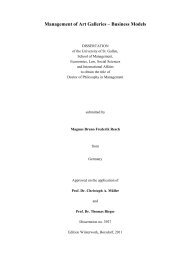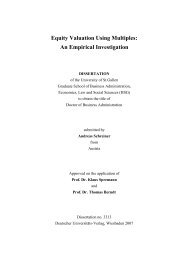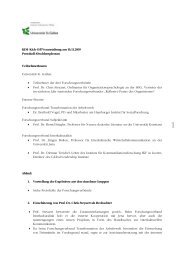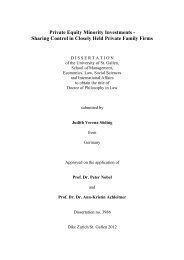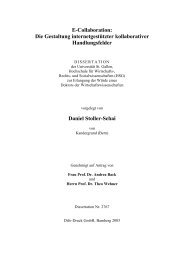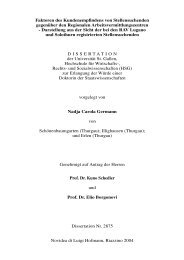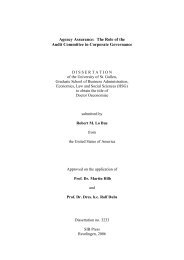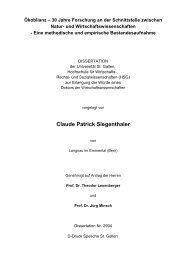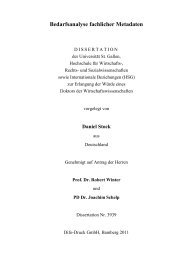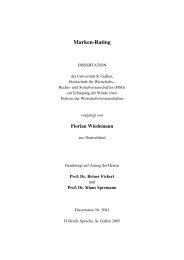The Impact of Direct Democracy on Society - Universität St.Gallen
The Impact of Direct Democracy on Society - Universität St.Gallen
The Impact of Direct Democracy on Society - Universität St.Gallen
- No tags were found...
You also want an ePaper? Increase the reach of your titles
YUMPU automatically turns print PDFs into web optimized ePapers that Google loves.
– 16 –aspect is the critique that citizens in direct democracies have no incentives to make wellinformeddecisi<strong>on</strong>s because the costs <str<strong>on</strong>g>of</str<strong>on</strong>g> informati<strong>on</strong> gathering are higher than the expectedbenefit (cf. DOWNS, 1957), which is particularly crucial for opti<strong>on</strong>al elements <str<strong>on</strong>g>of</str<strong>on</strong>g> directlegislati<strong>on</strong> (see KIRCHGÄSSNER et al., 1999, p.20 and p.47 c<strong>on</strong>t.). 26 Moreover, in an ec<strong>on</strong>omicmodel, MARINO and MATSUSAKA (2005) show that politicians have an incentive to supplybiased informati<strong>on</strong> to the citizenry in a world <str<strong>on</strong>g>of</str<strong>on</strong>g> partial delegati<strong>on</strong>, as takes place in directdemocracies, in order to prevent initiative- or referendum- induced budget cuts. 27 Anotherargument against direct democratic instituti<strong>on</strong>s, particularly referenda, is that they slow downthe political decisi<strong>on</strong>-making process which makes this political system unable to react fast toec<strong>on</strong>omic or societal changes (see KIRCHGÄSSNER et al., 1999, p.20). This leads to what iscalled a ‘<strong>St</strong>atus Quo bias’. 28 Moreover, BRETON (1996) suggests that instituti<strong>on</strong>s <str<strong>on</strong>g>of</str<strong>on</strong>g> directlegislati<strong>on</strong> prevent gains from logrolling, which implies vote trading, leading to a level <str<strong>on</strong>g>of</str<strong>on</strong>g>provisi<strong>on</strong> <str<strong>on</strong>g>of</str<strong>on</strong>g> public goods which is below the societally optimal level 29 . Finally, a relatedaspect is that means <str<strong>on</strong>g>of</str<strong>on</strong>g> direct legislati<strong>on</strong> prevent binding compromises necessary for reachinginternati<strong>on</strong>al agreements. 30My own c<strong>on</strong>tributi<strong>on</strong> to these societal aspects <str<strong>on</strong>g>of</str<strong>on</strong>g> influences <str<strong>on</strong>g>of</str<strong>on</strong>g> direct democracy will betw<str<strong>on</strong>g>of</str<strong>on</strong>g>old: first, after updating the index <str<strong>on</strong>g>of</str<strong>on</strong>g> direct democracy for the relevant time span, theanalysis will use the new data to reinvestigate the happiness aspect <str<strong>on</strong>g>of</str<strong>on</strong>g> direct democracy; andsec<strong>on</strong>d, the analysis will address some new transmissi<strong>on</strong> channels <str<strong>on</strong>g>of</str<strong>on</strong>g> direct democracy’sinfluence <strong>on</strong> well-being, channels that are different from those menti<strong>on</strong>ed above. Specifically,I will examine the impact <str<strong>on</strong>g>of</str<strong>on</strong>g> direct legislati<strong>on</strong> <strong>on</strong> the public goods <str<strong>on</strong>g>of</str<strong>on</strong>g> income redistributi<strong>on</strong>,public safety, and educati<strong>on</strong>. <str<strong>on</strong>g>The</str<strong>on</strong>g>se empirical analyses will be carried out using Swisscant<strong>on</strong>al data. <str<strong>on</strong>g>The</str<strong>on</strong>g> next secti<strong>on</strong> briefly summarizes why Switzerland is an appropriate countryfor studying such effects.26 A similar argument is that a direct democracy requires a higher level <str<strong>on</strong>g>of</str<strong>on</strong>g> civic engagement than a representativepolitical system, and a rati<strong>on</strong>al individual should not be expected to show such a level. For systematic andcasual empirical counter-evidence against both arguments, see KIRCHGÄSSNER et al., 1999, pp. 53-68.27 See also related empirical evidence for the provisi<strong>on</strong> <str<strong>on</strong>g>of</str<strong>on</strong>g> public goods in districts with an override opti<strong>on</strong> in theUnited <strong>St</strong>ates, described in chapter VI.28 For counter-arguments and instituti<strong>on</strong>al soluti<strong>on</strong>s to this problem at the Swiss federal level (seeKIRCHGÄSSNER et al., 1999, pp. 21 c<strong>on</strong>t.). Particularly initiatives serve to ‘accelerate’ the political process.<str<strong>on</strong>g>The</str<strong>on</strong>g> <strong>St</strong>atus Quo bias might also be positively interpreted as a higher degree <str<strong>on</strong>g>of</str<strong>on</strong>g> c<strong>on</strong>tinuity and countability inpolicy-making (KIRCHGÄSSNER et al., 1999, p. 24).29 See also footnote 7. <str<strong>on</strong>g>The</str<strong>on</strong>g> paper by BARANKAY (2002) might serve as supportive empirical evidence.30 For counter-arguments, see KIRCHGÄSSNER et al., 1999, p. 33, and the references therein.



